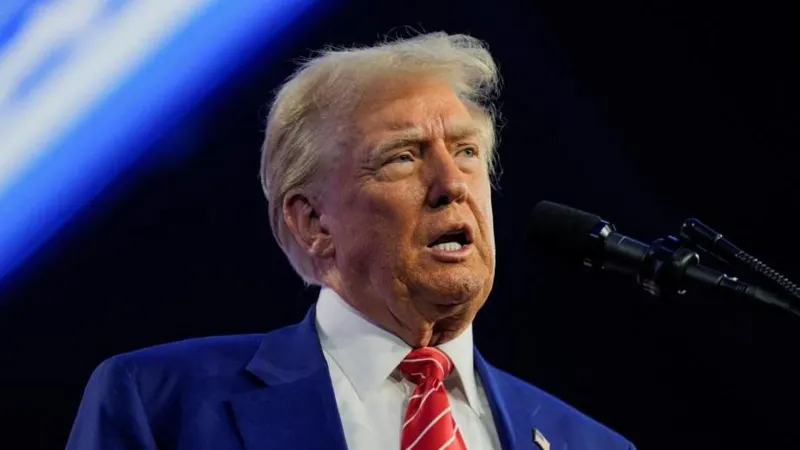Donald Trump Scheduled for Sentencing in New York Hush Money Case Days Before Inauguration
A New York judge has ordered Donald Trump to appear for sentencing on January 10, 2025, in his hush-money case. This date falls less than two weeks before the president-elect is set to be inaugurated for his second term in office. The case stems from Trump’s May 2024 conviction on 34 felony counts of falsifying business records related to a $130,000 payment made to adult-film star Stormy Daniels.
Judge Opts for Unconditional Discharge
Justice Juan Merchan, presiding over the case, indicated that Trump would not face jail time, probation, or a fine. Instead, the former president is expected to receive an “unconditional discharge,” allowing him to avoid punitive measures. The judge stated that Trump could appear for sentencing either in person or virtually.
Justice Merchan emphasized his intent to balance legal accountability with the unique challenges of sentencing a sitting president-elect. He also rejected Trump’s motion to dismiss the case, which argued that the conviction would hinder his ability to govern effectively during his upcoming term.
Trump Responds with Defiance
Trump reacted strongly to the sentencing announcement, posting on his Truth Social platform that the judge’s decision was a “political attack” and part of a “rigged charade.” He described the case as unconstitutional and a direct threat to the presidency.
“President Trump must be allowed to focus on the vital duties of the presidency without interference from politically motivated witch hunts,” said Trump’s spokesperson, Steven Cheung.
Cheung further stated, “There should be no sentencing, and President Trump will continue fighting against these hoaxes until they are all dead.”
The Hush-Money Case: A Timeline
The case centers on payments made in the closing days of Trump’s 2016 presidential campaign. Michael Cohen, Trump’s former lawyer, paid Stormy Daniels to remain silent about an alleged sexual encounter with Trump. Trump later reimbursed Cohen, allegedly disguising the payments as legal fees.
Prosecutors argued that these falsifications were intended to conceal violations of election laws, while Trump has consistently denied any wrongdoing, maintaining that the case is a politically motivated attempt to damage his 2024 campaign.
Legal Arguments and Supreme Court Rulings
Trump’s defense team previously argued that the charges violated a Supreme Court ruling granting broad immunity to presidents for official actions taken while in office. However, Justice Merchan ruled that this immunity did not apply to Trump’s actions prior to his presidency or after leaving office.
The judge also addressed Trump’s concerns about the case interfering with his presidency. Options considered included delaying the sentencing until Trump’s term ends in 2029 or ensuring the sentence does not involve incarceration. Merchan ultimately rejected the idea of overturning the jury’s verdict, calling it an “extreme remedy.”
Unprecedented Legal Challenges
Trump’s conviction marks the first time a U.S. president-elect has faced sentencing as a convicted felon. While falsifying business records can carry a prison sentence of up to four years, legal experts believe incarceration is unlikely given Trump’s age, 78, and his lack of prior criminal record.
Justice Merchan’s decision aligns with these expectations, opting for a resolution that avoids jail time. His ruling also ensures the sentencing will not impede Trump’s presidential transition or the execution of his duties as president.
Trump’s Other Legal Battles
The hush-money case is just one of several legal challenges Trump is currently facing. He has been charged in three additional cases:
- Classified Documents Case – Allegations of mishandling sensitive government records.
- 2020 Election Interference (Georgia) – Accusations of attempting to overturn election results in Georgia.
- 2020 Election Interference (Federal) – A broader federal case related to efforts to undermine the 2020 presidential election outcome.
Despite these charges, Trump has remained defiant, portraying himself as a victim of political persecution. His supporters view the cases as attempts by his opponents to derail his political comeback.
Impact on Trump’s Presidency
Legal experts note the historic and unprecedented nature of Trump’s situation. If he takes office in January 2025, he will be the first convicted felon to serve as president. His legal team has signaled plans to appeal the hush-money conviction after sentencing.
The president-elect has argued that the ongoing legal battles are distractions orchestrated to harm his presidency. In his motion against the case, he claimed it would “impede his ability to govern effectively.”
Justice Merchan acknowledged the potential challenges but reiterated that legal accountability must be upheld, even for a president. “No one is above the law,” the judge wrote in his order.
Looking Ahead
As Trump prepares for his inauguration, the January 10 sentencing hearing looms large. While the legal drama continues, the president-elect remains focused on resuming his role as commander-in-chief.
Despite his legal troubles, Trump’s supporters remain steadfast, viewing his conviction as a badge of honor in his fight against what they see as a politically motivated justice system. Whether these cases will ultimately define his presidency or bolster his image as a fighter against the establishment remains to be seen.






